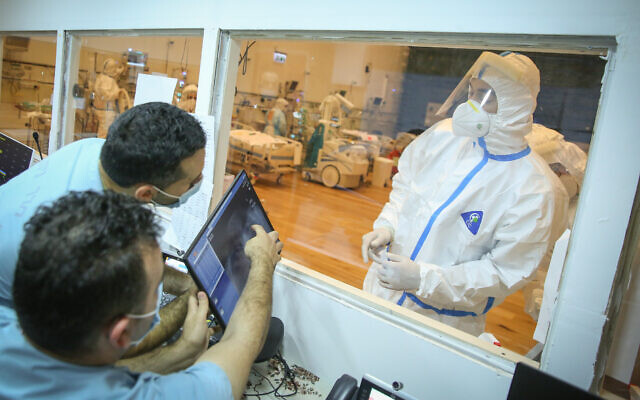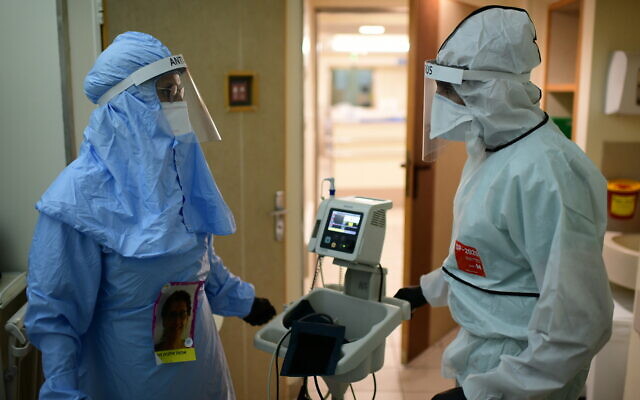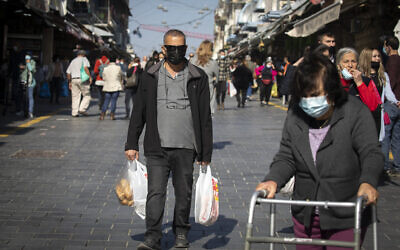Top doctors say rise in coronavirus patients steeper than ever; health officials said to warn of 10,000 cases a day if lockdown not tightened

Hospital chiefs on Monday warned that they were seeing signs Israel was entering the worst wave of the coronavirus pandemic yet, with new cases flooding their facilities.
“We are at the very beginning of a very serious wave,” Prof. Pierre Singer, head of intensive care at Beilinson Medical Center in Petah Tikva, told Channel 13 news.
He said hospitals were seeing “younger cases,” including patients in their early 30s.
“I see whole families infected. People have not understood this disease is infectious and dangerous. It’s not over,” Singer said.
Salman Zarka, director of Safed’s Ziv Medical Center, said the disease was “hitting again, more than in previous waves.”
“Patients are coming to the hospital in very serious condition… We still have a few months in which we must keep the rules… It’s such a shame, so unnecessary to get sick now, when we are seeing the light at the end of the tunnel,” he said, referring to the national vaccine drive.

Shlomi Codish, director of Beersheba’s Soroka Medical Center, also said his hospital was seeing a “steep, sharp rise” in new patients.
“The rise is steeper than during the second wave and we expect that if it continues this way we’ll be at a much more severe state at the end of this wave,” he said. “The patients are young like they were in the second wave and in very serious condition, and as long as this continues, unfortunately it will be accompanied by significant morbidity and mortality.”
The Health Ministry said late Monday there were 7,061 new infections confirmed during the day, a preliminary figure that was sure to rise further as more tests and data are processed. It appeared to be the highest single-day tally since early October.
According to the Health Ministry, 1,345 people were hospitalized as of Monday night for COVID-19 complications, an increase of nearly 300 patients since Thursday.
The ministry said 772 people were in serious condition, with 179 on ventilators. During the height of the second wave in early October, serious cases peaked at 900.
The recent rise in new infections has been accompanied by increasing fatalities, with the ministry reporting over 190 coronavirus deaths over the past week. Since the pandemic began, 3,445 Israelis have died from COVID-19.
Israel has recorded 448,173 infections, including 53,912 active cases.

Israel last week imposed a third national lockdown to curb the spread of the virus, though health officials and Prime Minister Benjamin Netanyahu have called to tighten restrictions as infections continue to surge.
Ministers have been told failure to enact a tight lockdown in the coming days will cause 500-1,000 more deaths than if new restrictions are announced, Channel 13 reported Monday.
Health officials fear Israel could see infections rocket to 10,000 a day within weeks, according to the report.
The network also said the prime minister supports a strict lockdown, saying other strategies have not proven effective in lowering morbidity anywhere in the world.
Earlier Monday, Netanyahu told cabinet ministers that they will reconvene in 48 hours to decide on tightening the lockdown.
Netanyahu asserted that alongside the fast-paced mass vaccination drive, stricter limits on public life for a short period will be enough to enable rolling back the restrictions and reviving the economy.

Health Minister Yuli Edelstein warned ministers that Israel was heading toward the same fate as Italy, which last year was one of the worst-affected countries and has so far suffered some 75,000 deaths.
“If we don’t take the most stringent action, in March we will be in the same situation as Italy last March,” Edelstein said, according to leaks from the meeting reported by Hebrew media.

However, there is opposition within the cabinet to some possible lockdown measures, in particular closing the education system, a move Blue and White chairman Benny Gantz has said he will not agree to. A meeting of the core panel of ministers tasked with forming policy on dealing with the virus is reportedly scheduled to convene Tuesday to decide on a full closure of the education system. Only the full cabinet can give final approval to lockdown orders.
The current restrictions clamped down on commercial activities, but largely left the education system and many businesses still operating.
The lockdown rules bar Israelis from entering another person’s home; restrict movement to one kilometer (six-tenths of a mile) from home, with exceptions, such as for vaccinations; shut down commerce (except for essentials), leisure, and entertainment; limit public transportation to 50 percent capacity; and limit workplaces that do not deal with customers face-to-face to 50% capacity.
As reported by The Times of Israel
